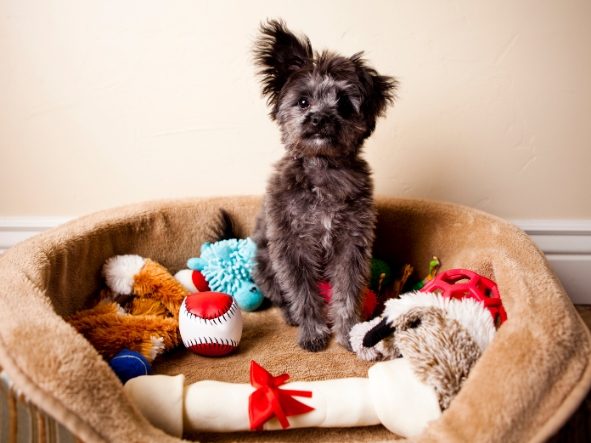Microplastics are tiny plastic particles that measure less than 5mm in size. They can be found in various consumer products, including all categories of dog products. Microplastics come from a variety of sources, including the breakdown of larger plastic items, the use of microbeads in personal care products, and the shedding of synthetic textiles during washing. They pose the greatest risk to our pets because of their small size.
In dog products, microplastics may be found in items including toys, bedding, crates, and grooming products. Microplastics are even found in dog food containers. These small particles can pose a risk to humans, dogs and the environment. When dogs play with toys or chew on bedding that contains plastics, they can ingest these particles and potentially cause health problems.
In the environment, microplastics can make their way into water sources and harm wildlife. Microplastics can also contribute to plastic pollution, as they are not easily biodegradable and can persist in the environment for hundreds of years.
Given these concerns, it's important to be mindful of the products you choose for your dog and to opt for products that are free of microplastics whenever possible. It is in fact better to avoid all plastics when making purchasing decisions for your dog. Additionally, you can help reduce the overall impact of microplastics by properly disposing of all plastic items and choosing products made from sustainable, eco-friendly materials. Online publications like Sustainable Jungle are a good source for safe, sustainable products of all kinds.
All types of plastic can have negative impacts on dogs and the environment, but some are considered to be worse than others. Here are a few of the types of plastic that are considered to be the most harmful to dogs:
- Polyvinyl Chloride (PVC): PVC has been called the ‘poison plastic’ because so many of its ingredients are known to leach out throughout its entire life cycle. This type of plastic is commonly used in dog toys, leashes, and collars. It can contain harmful additives, such as phthalates, which can seep into the environment and potentially cause health problems in dogs and humans.
- Polystyrene (Styrofoam): This type of plastic is commonly used in pet bedding and can release harmful chemicals into the environment. It is also not biodegradable, so it contributes to plastic pollution in our landfills and oceans.
- Polycarbonate: This type of plastic is often used in pet food containers and water bottles. It is commonly used in plastic bully stick holders. It can release a harmful chemical called bisphenol A (BPA) into the food or water stored in the containers, which can cause negative health effects in dogs, all pets, and humans.
The pet industry lacks regulations that make it hard to know what you’re buying. Just because it says “eco-friendly” doesn’t mean a product won’t harm your pet.
Some pet product manufacturers are now producing dog toys, dog food bowls, and bedding made from natural materials, such as cotton or hemp, which are safer for the environment and for our pets.
Companies like BarkerFun are creating new product categories for sustainable dog products. They make a one of a kind slow feeder dog food container. It is a unique enrichment dog product. Elevated off the ground and fixed to a solid object like a table leg or fence post. It is made out of aluminum. It will last for lifetimes.

